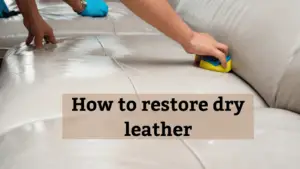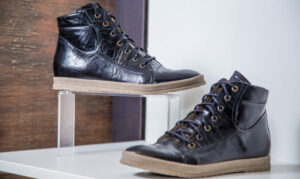How to Fix Sticky Leather
Sticky leather can be a frustrating problem that affects a wide range of leather goods from clothing and furniture to accessories and car interiors.
But why does leather get sticky and how can it be fixed?
In this post, we’ll examine the various causes of leather stickiness and offer practical tips and solutions for restoring your leather goods to their original non-sticky state.

Why does leather get sticky?
Leather gets sticky when it comes into contact with oils and sweat from our skin. These oils build up on the leather surface while sweat penetrates the pores of the leather breaking down the fibers and causing a sticky mess. Other causes include spillage, exposure to heat and humidity, and the over-conditioning of leather.
-
Excessive heat or sunlight
Overexposure to heat can cause natural oils and waxes in leather to soften, making it more pliable and sticky.
Additionally, the heat can cause fibers in the leather to expand and become more flexible, making leather clothing, such as skirts and pants, more susceptible to sticking to other surfaces.
-
Body oils
Oils from your body especially when you sweat during hot weather can cause the leather to become sticky due to exposure to heat and humidity.
In hot weather such as in the summer, leather becomes warm causing its pores to open up and absorb the body oils from your skin. This mainly happens when you engage in activities that cause excessive sweating.
As a result, the leather softens and becomes more pliable, which makes it sticky. Also, your leather clothing will likely lose shape since the fibers are too soft to maintain their original form.
-
Over conditioned leather
When leather is over-conditioned, it means that too much oil or conditioner has been applied to the surface of the leather. This can cause the leather to become more supple and malleable and as a result, feel sticky.
The excess oil or conditioner can make the leather more likely to attract dust and dirt, and the surface may become tacky to the touch.
Furthermore, over-conditioning leather can make it lose its natural patina or even become discolored.
-
Spills
Spills or liquids can also make your leather items like couches and car seats sticky or tacky.
When a liquid comes into contact with leather, it can react with the oils or finishes on the surface of the leather and cause it to become tacky to the touch. This can occur with spills of any kind, whether it’s a liquid like water, juice, or alcohol, or a sticky substance like jelly or syrup.
The tackiness can be caused by the liquid breaking down the finish or oils on the leather, or by the liquid being absorbed into the leather and causing it to become softer and more pliable.
This can also happen if the leather is not properly treated and protected, which makes it more prone to absorb liquids.
How to fix sticky leather
1. Keep leather clean and dry
Ensuring your leather items are clean and dry before storage can prevent them from becoming sticky.
Regular cleaning helps to prevent the build-up of dirt, grime, and other types of residue that can make leather sticky.
To clean the leather, use mild soap and water or a specialized leather cleaner. You can also use equal parts white vinegar and water as this will help to remove all the grime that may be causing the stickiness.
Additionally, cleaning can help to remove any substances that may have caused a chemical reaction to occur on the leather surface and make it sticky.
Most importantly, ensuring the items are completely dry before storage helps to keep leather from sticking to other surfaces when in storage. This means that you should also ensure that the items are not exposed to any moisture when in storage.
2. Use a dehumidifier
As explained earlier, humidity is one of the causes of sticky leather because it breaks down the natural oils, and waxes on the leather can cause it to absorb moisture.
For this reason, using a dehumidifier can help to control the humidity in your room or storage area. High humidity levels can also lead to the growth of mold and mildew so using a dehumidifier can prevent the leather from absorbing moisture hence keeping it dry.
Moreover, it maintains a comfortable temperature in storage, which helps to preserve the natural oils and waxes in the leather preventing it from becoming dry and brittle.
3. Avoid overexposure to heat
We have seen that leather should be stored in a dry place away from high humidity. Similarly, it should not be kept away from direct heat sources and high temperatures.
For instance, it’s important to avoid wearing leather clothing like jackets and pants in hot and humid weather or while engaging in activities that can cause sweating.
A combination of moisture and heat accelerates the process of the leather becoming sticky.
For leather seats, you are advised to park your car in a shaded area in the summer or use a sunshade to protect the seats from direct sunlight.
4. Use a leather protectant
Another solution is to use a leather protectant to protect the leather from environmental factors like humidity, heat, and UV rays.
It also helps the leather repel water and other messes that can cause it to become sticky.
In addition, it prevents the leather from drying out since it prevents the loss of natural oils.
It’s important to point out that leather protectants come as sprays, creams, or lotions so choose the one that is specially formulated for your leather items.
Furthermore, for couches, chairs, and car leather seats, consider using seat covers to protect them from body oils, sweat, and other substances that can make the leather seats slippery or sticky.
Conclusion
There is no doubt that leather seats are worth it but they tend to become sticky when exposed to heat, humidity, and body oils among other causes.
To prevent this stickiness, it is important to avoid exposing leather to high temperatures and humidity and to keep your items away from direct heat sources. This means that you should avoid wearing leather in hot or humid weather or engaging in outdoor activities that cause excessive sweating.
Additionally, cleaning and drying leather completely can help to stop the leather from becoming tacky, especially when in storage.
Also, using a leather protectant can provide an extra barrier to protect the leather items from spills, oils, and other things that make them sticky.





